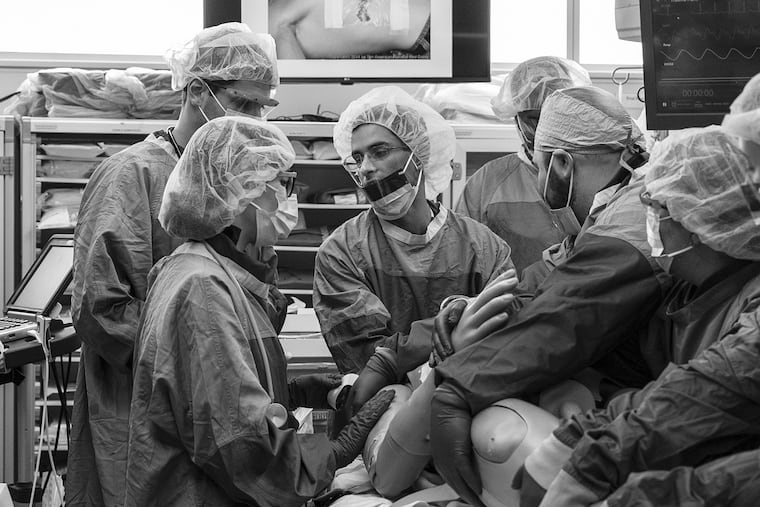Social justice is the foundation of healthcare — and medical education l Opinion
Generations of health professionals were trained in the traditional medical education system that Dr. Goldfarb celebrates. Nonetheless, the U.S. is experiencing a regrettable state of health.

Dr. Stanley Goldfarb, our medical school colleague at the University of Pennsylvania, published an essay in the Wall Street Journal last week titled, “Take two aspirin and call me by my pronouns.” Goldfarb argues for a return to “the traditional American model of medical training” — one that he believes delivered “a technically proficient and responsible physician corps for the U.S.” He laments a move toward greater emphasis on social justice, health policy, and population health.
Generations of health professionals were trained in the traditional medical education system that Goldfarb celebrates. Nonetheless, the U.S. is experiencing a regrettable state of health.
» READ MORE: Penn doctor says gun control, climate change don’t belong in med school; critics lash back
For the first time in decades, the U.S. life expectancy is declining rather than increasing. This year, more than 20,000 infants will die, as will nearly 1,000 pregnant and postpartum women. Black infants are twice as likely to die as white infants, and black mothers are nearly four times as likely to die as white mothers. Here in Philadelphia, we have the highest overdose death rate among large U.S. cities, and last year, over 350 Philadelphians died from homicide.
These are alarming health statistics, meriting the attention and concern of every health professional. As educators, it is our mandate to prepare the next generation of doctors, practitioners, and scientists for the complex health and social challenges they will encounter at work every day. The social complexities will not go away if we ignore them in our curricula.
Central to our work is the belief that human health is inextricably linked to the conditions in which we live, learn, work, and play, and the science is on our side.
» READ MORE: Treating gun violence in Philadelphia: 6 health workers share memories
In Flint, Mich. it was Dr. Mona Hanna-Attisha, a pediatrician, who noted her patients’ systematically elevated blood lead levels. She followed the data trail to their source: aging and flawed public water infrastructure. Hanna-Attisha wasn’t satisfied to treat patients one at a time. Instead, she probed the electronic health record and used population health science to find the root causes of the problem. It turned out that public officials had made cost-cutting decisions that poisoned the water, and her patients.
Half of Flint’s residents are black. Four in 10 live in poverty. It took an activated, educated physician to recognize Flint’s water crisis and to advocate on behalf of her patients.
Goldfarb laments that medical education emphasizes social justice, which he asserts “relates to health care only tangentially.”
Tell that to a mother in Flint.
» READ MORE: Why Philadelphians should be carrying naloxone right now | Opinion
Social and health policies have always determined who gets sick and who gets care, and where, and how. Understanding the social drivers of health and illness is not peripheral or tangential to health. It is key to diagnosing and meeting a patient’s fundamental needs, and to restoring health.
This is true in emergency rooms in Philadelphia and across the country, where doctors routinely repair the wounds caused by gun violence. We can suture the wounds and send patients home — but we also have the opportunity to reach deeper, using evidence-based strategies to interrupt the cycle of violence that caused those wounds. This approach — which demands curiosity and communication about the underpinnings of violence — combines the best of science, technical skill, and the responsible practice of medicine.
Goldfarb complains that “Curricula will increasingly focus on climate change, social inequalities, gun violence, bias and other progressive causes only tangentially related to treating illness.” Yet, it is well established, for example, that bias in medicine has led to underdiagnosis of heart attacks in women, to undertreatment of depression in black patients, and to difficulty scheduling primary care appointments for low-income patients covered by Medicaid.
» READ MORE: In Philadelphia and around the country, overdoses at public libraries are a daunting reality
As medical and public health educators, we are inspired by the current generation of students, many of whom are reaching for social justice as the very foundation of health. They hold an unshakable belief that individuals, and society, will not be well when basic human needs — for housing, food, health care, safety — remain unmet.
Like our students, we are not content to say “not our problem.” In fact, if not us, then who? And if not now, then when?
Carolyn Cannuscio, ScD., is associate professor of family medicine and director of research at the Penn Center for Public Health Initiatives (CPHI); Zachary F. Meisel, M.D., is director of the Center for Emergency Care Policy Research and associate professor of emergency medicine at the Perelman School of Medicine at the University of Pennsylvania; Rachel Feuerstein-Simon is a researcher at CPHI. Follow Cannuscio and Meisel on twitter @zacharymeisel and @carolyncannu.